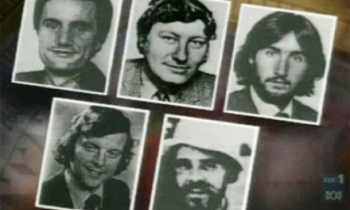Journalists' leaders in India are being urged to lead a new campaign to reinforce rights of women journalists in one of Asia's dramatically expanding media markets.
A five-day union debate on gender equality and women's rights concluded with a call to make women's rights and improved portrayal of women priorities over the coming year. Unions are being invited to set up special gender councils to press for improved conditions for women working in media and there are new calls for more action by media organisations over what the International Federation of Journalists (IFJ) says is a 'scandal of neglect' regarding rights of women.
'The time has come for India's established commitment to equality to be properly recognised in the way media work and behave,' said Pamela Moriniere, IFJ Gender Officer. 'The failure over the years by media organisations and journalists' groups to properly focus on rights of women amounts to a scandal of neglect that cannot go on.'
Representatives of Indian journalists' unions agreed an extensive declaration after meetings on gender equality held in New Delhi, India, from March 28 to April 1. Major concerns included the lack of adequate representation of women in the leadership of unions and in the executive belt of media management and the need for women's rights to figure more strongly in collective bargaining and union work.
As well as setting up gender councils 'without further delay,' unions are being asked to press for proportional representation of women on all decisionmaking bodies and access to leadership positions, to encourage transparency and fairness in media houses when promoting staff, to combat sexual harassment and bullying at work, to promote fair gender portrayal in media and to campaign for facilities to enable both men and women to reconcile family and work. Media employers are urged to introduce equal opportunity policies and to eliminate the contract system of hiring people, ensuring women and men journalists enjoy the provisions of India's Industrial employment (Standing Orders) Act which applies to journalists.
The workshops form part of a project funded by the European Union and managed by the International Federation of Journalists (IFJ), together with the All India Newspapers Employees Federation (AINEF), the Deutcher Journalisten Verband (DJV) and the National Union of Journalists of Great Britain and Ireland (NUJ). The project promotes cooperation between journalists in India and Europe over women in media and it aims to strengthen relations between journalists unions on gender equality.
Further activities planned in the on-going project, which is part of the EU-India Economic Cross Cultural Programme, include the production of a gender equality handbook to give concrete best practices examples, ideas and targets for the improvement of conditions of women in journalism and portrayal of women in media.
THE DECLARATION:
We, journalists attending the seminars Cracking the Glass Ceiling � Women in Media Institutions and Collective Bargaining and Women's Rights, held in New Delhi, 28th March-April 1st 2006 demand:
- That IFJ Indian affiliates are invited to commit themselves to organise without further delay a Gender Council, composed equally of women and men, within their structure which will monitor gender equality policies and activities in the unions, including training for women journalists and ensuring gender mainstreaming in all aspects of union activity;
- That all Indian media employees' unions pledge to have proportional representation of women on all decision making bodies by the next IFJ Congress in 2007;
- That Indian media employees' unions ensure that participation by union members at any of their meetings, seminars and delegations are gender-balanced;
- That media employees' unions ensure that promotional practices are fully transparent, that they are based upon seniority and fair assessment and that they recognise the special circumstances in which women work;
- That media employers employ women and men journalists under the provisions of the Industrial employment (Standing Orders) Act which is applicable to journalists in India and put an end to the Fixed Term contract system. Journalists and other media employees have a legal right to join a trade union and any such prohibition should be treated as ultra vires;
- That media employees' unions commit themselves to eliminate all forms of violence, harassment and intimidation against women journalists;
- The media employees' unions commit themselves to working together with media employers to promote fair gender portrayal in the media, including the development of guidelines;
- That women journalists have access to leadership positions within media houses and unions without discrimination and shall be encouraged to take such positions;
- That facilities be provided by media employers for women and men journalists to reconcile work and family life, including provision of support for child care, flexible working hours, and support for women who work night shifts (such as, free and secure transport arrangements and special retiring rooms).
- That media houses adopt and develop equal opportunity policies and promote and publish vacancies to ensure fair access of all to employment.
Delhi, 1 April 2006









